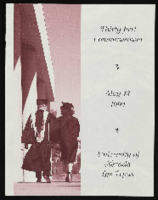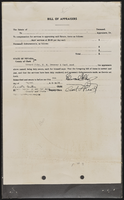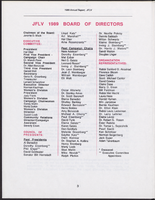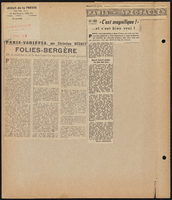Search the Special Collections and Archives Portal
Search Results
Punam Mathur (Elaine Wynn Foundation) oral history interview conducted by Kelliann Beavers and Elia Del Carmen Solano-Patricio: transcript
Date
Archival Collection
Description
From the Lincy Institute "Perspectives from the COVID-19 Pandemic" Oral History Project (MS-01178) -- Community organization interviews file.
Text

Transcript of interview with George Gilbert by Ruth Guidi, February 10, 1975
Date
Archival Collection
Description
On February 10, 1975, Ruth Guidi interviewed George Gilbert (born 1931 in Southgate, California) about his life in Nevada. George first talks about his education in Las Vegas and his family background. He also talks about times during World War II, the shopping facilities available to those in Las Vegas, the casinos that existed, the churches that were built, and the Helldorado parades. The two also discuss social clubs, politics, the atomic testing, environmental and social changes, the Mormon Fort, Hoover Dam, and the first movie theaters.
Text

University of Nevada, Las Vegas (UNLV) 31st commencement program
Date
Archival Collection
Description
Commencement program from University of Nevada, Las Vegas Commencement Programs and Graduation Lists (UA-00115).
Text
Audio clip of Marzette Lewis
Date
Archival Collection
Description
Part of an interview with Marzette Lewis by Claytee White on October 30, 2012. Lewis discusses community involvement in the movement for equality in elementary schools to stop bussing children to schools in different neighborhoods.
Sound

Antioco Carrillo interview, 2019: transcript
Date
Archival Collection
Description
Interviewed by Monserrath Hernández, Rodrigo Vazquez, and Laurents Benitez-Bañuelos. A native of Jalisco, Mexico, moved to Las Vegas when he was about 20-year old in 1987. Attended CSN and UNLV. His history with Las Vegas is embedded in the 1980s Las Vegas gay scene and education for AIDS. He is and activist and the Executive Director of Aid for AIDS of Nevada. He and Theodore Small are the first same-sex marriage in Nevada.
Text

Transcript of interview with Norman Forsythe by Steve Flint, March 19, 1981
Date
Archival Collection
Description
Text

Stewart family real estate documents
Date
Archival Collection
Description
Stewart family real estate documents
Text

Don Perry interview, March 05, 1978: transcript
Date
Archival Collection
Description
On March 5th, 1978, Karen Croteau interviewed Don Perry (b. 1928 in Clarksburg, West Virginia) about Paiute Indians and life on a reservation. Perry begins by mentioning his own Indian heritage with a Cherokee mother and his wife’s Paiute heritage. Perry focuses on his conversations with his wife’s grandmother, who lived on the Paiute reservation since birth, from who he learned about the reservations history. He particularly delves into the traditions of Indian burials, governing on the reservation, and the difference between an Indian reservation and an Indian colony. Additionally, he talks about recreation on the reservations, education of Paiute Indians, and how reservations have changed. Throughout the interview, Perry gives personal anecdotes about his life in connection to the Paiute people and his experiences with their traditions and belief systems. Perry ends by discussing governing politics of the Paiute reservation and the start of Las Vegas as a gambling town.
Text


